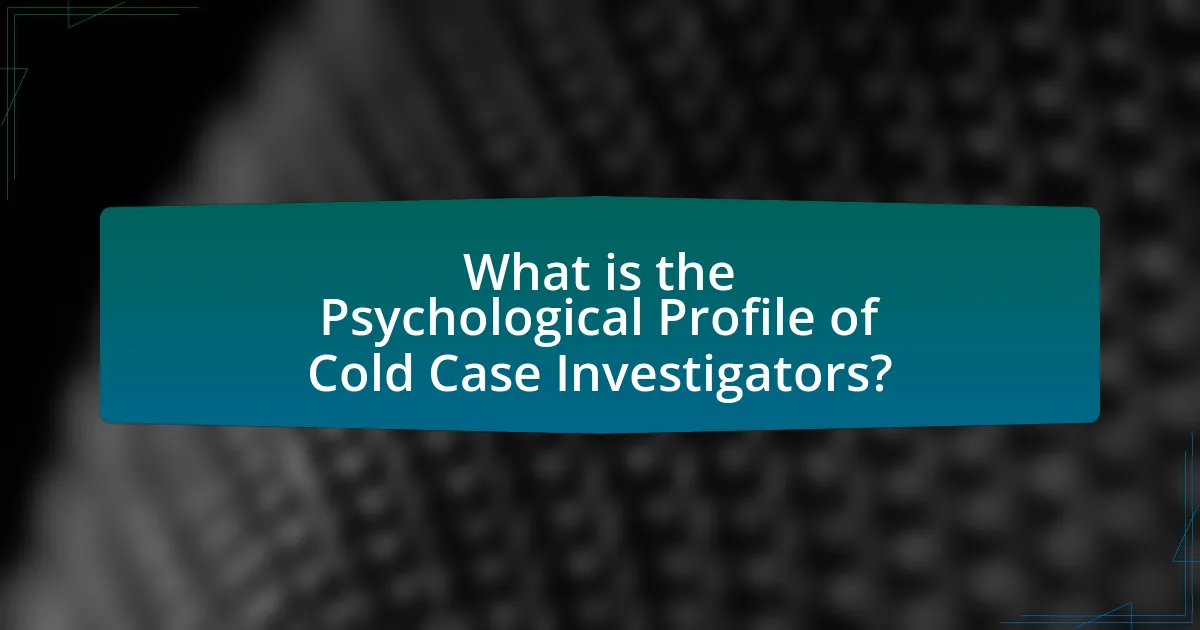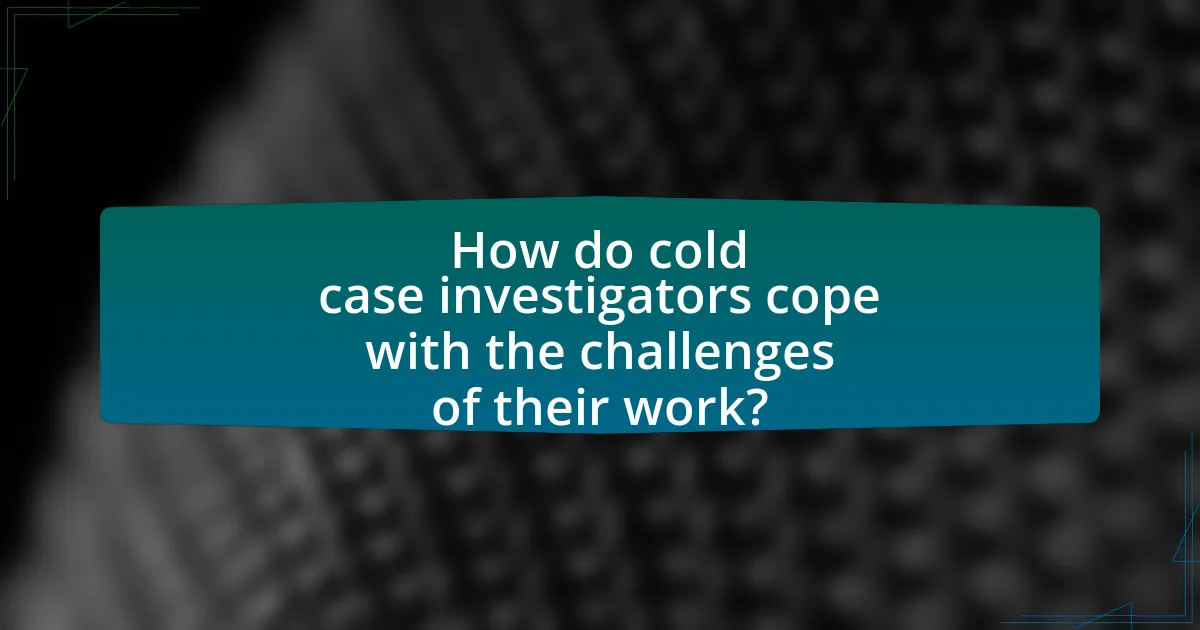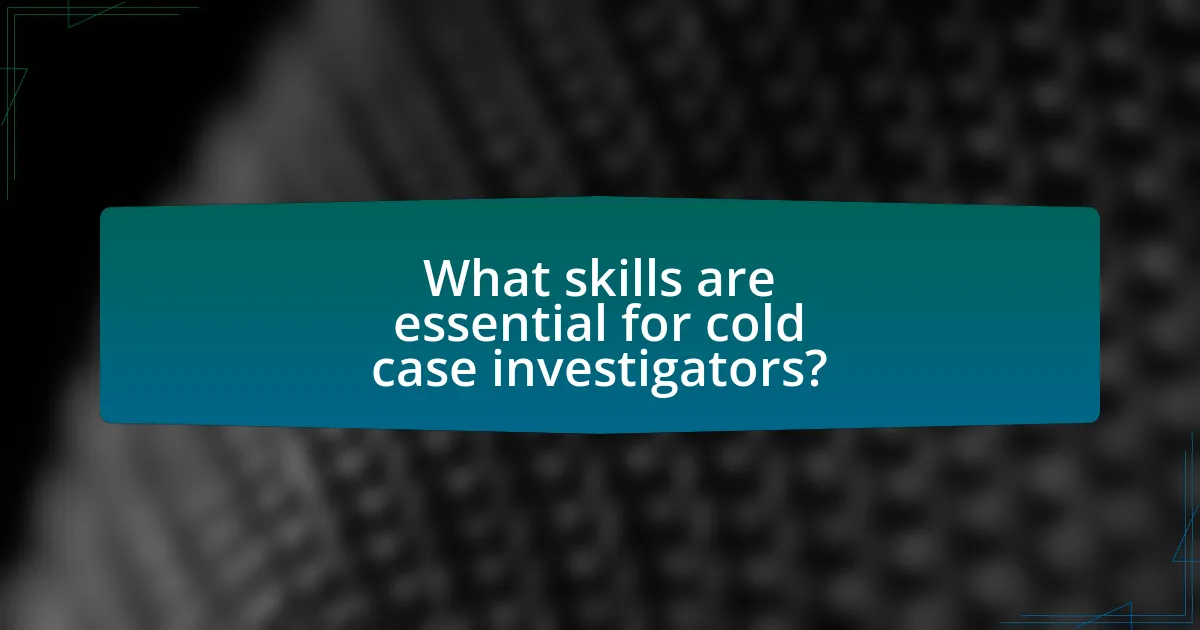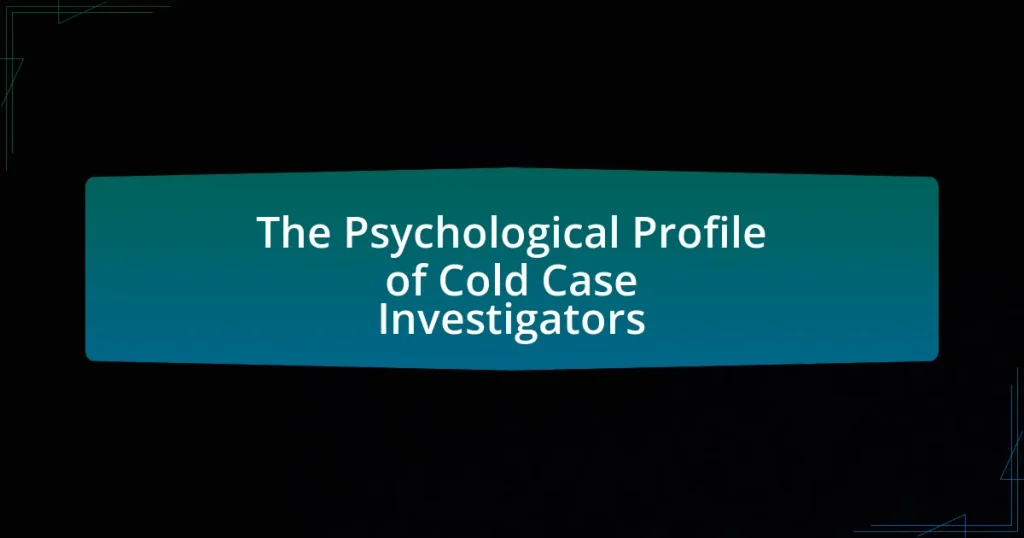The article examines the psychological profile of cold case investigators, highlighting key traits such as persistence, analytical thinking, emotional resilience, and empathy. It discusses how these psychological traits influence investigative strategies and decision-making processes, ultimately impacting the success of solving cold cases. The article also explores the importance of emotional resilience in coping with the challenges of unresolved cases, the motivations driving individuals to pursue this line of work, and the essential skills required for effective investigations. Additionally, it emphasizes the role of communication, collaboration, and technology in enhancing investigative practices and improving case resolution rates.

What is the Psychological Profile of Cold Case Investigators?
The psychological profile of cold case investigators typically includes traits such as high levels of persistence, analytical thinking, and emotional resilience. These investigators often exhibit a strong sense of justice and a commitment to solving complex cases, which can be attributed to their motivation to bring closure to victims’ families. Research indicates that successful cold case investigators possess excellent problem-solving skills and the ability to think critically under pressure, as they frequently analyze extensive amounts of evidence and revisit old leads. Additionally, studies show that emotional intelligence plays a crucial role, enabling them to empathize with victims’ families while maintaining objectivity in their investigations.
How do psychological traits influence cold case investigations?
Psychological traits significantly influence cold case investigations by shaping the decision-making processes and investigative strategies of detectives. Traits such as empathy, intuition, and analytical thinking enable investigators to connect with victims’ families, understand the emotional context of cases, and analyze evidence more effectively. For instance, studies have shown that detectives with high levels of empathy are better at building rapport with witnesses, which can lead to more valuable information being uncovered. Additionally, traits like persistence and resilience are crucial, as cold cases often require prolonged efforts and the ability to cope with setbacks. Research indicates that investigators who possess these psychological traits are more likely to approach cold cases with a mindset conducive to uncovering new leads, ultimately increasing the chances of solving these complex cases.
What specific personality traits are common among cold case investigators?
Cold case investigators commonly exhibit traits such as persistence, analytical thinking, attention to detail, and strong communication skills. Persistence is crucial as these investigators often work on cases that have remained unsolved for years, requiring them to remain dedicated despite challenges. Analytical thinking allows them to evaluate evidence critically and develop new theories based on existing information. Attention to detail is essential for uncovering overlooked clues that could lead to breakthroughs in cases. Strong communication skills facilitate collaboration with other law enforcement agencies, witnesses, and families of victims, ensuring that all relevant information is shared effectively. These traits collectively enhance their ability to solve complex cases and bring closure to victims’ families.
How do these traits affect their investigative approach?
Traits such as persistence, analytical thinking, and empathy significantly affect the investigative approach of cold case investigators. Persistence drives them to continue pursuing leads despite challenges, ensuring that no potential evidence is overlooked. Analytical thinking enables them to dissect complex cases, identify patterns, and connect seemingly unrelated information, which is crucial in solving cases that have remained unresolved for years. Empathy allows them to understand the emotional impact of the case on victims’ families, fostering trust and cooperation, which can lead to new information or witnesses coming forward. These traits collectively enhance their ability to navigate the intricacies of cold cases, ultimately increasing the likelihood of resolution.
What role does emotional resilience play in cold case investigations?
Emotional resilience is crucial in cold case investigations as it enables investigators to cope with the psychological stress and emotional toll associated with unresolved cases. Investigators often face frustration from lack of leads and the emotional weight of victims’ families, which can lead to burnout. Research indicates that emotionally resilient individuals are better equipped to manage stress, maintain motivation, and sustain focus over long periods, which is essential in the often lengthy and complex nature of cold cases. For instance, a study published in the Journal of Criminal Justice found that resilience positively correlates with job satisfaction and performance among law enforcement personnel, highlighting its importance in maintaining effective investigative practices.
Why is emotional resilience important for cold case investigators?
Emotional resilience is crucial for cold case investigators because it enables them to cope with the psychological stress and emotional toll associated with unresolved cases. Investigators often face frustration from lack of progress, exposure to traumatic details, and the pressure of seeking justice for victims and their families. Research indicates that emotional resilience helps individuals manage stress, maintain focus, and sustain motivation, which are essential for effectively navigating the complexities of cold cases. For instance, a study published in the Journal of Criminal Justice found that resilient officers exhibited better problem-solving skills and lower levels of burnout, highlighting the importance of emotional resilience in maintaining investigative efficacy and mental well-being.
How do investigators develop emotional resilience over time?
Investigators develop emotional resilience over time through a combination of experience, training, and support systems. As they encounter and process challenging cases, they learn coping strategies that help them manage stress and emotional fatigue. Research indicates that exposure to traumatic events can lead to the development of resilience, as investigators adapt their emotional responses to better handle future stressors. Additionally, ongoing professional development and peer support networks provide essential resources for emotional regulation and mental health maintenance, reinforcing their ability to cope with the demands of their work.
What are the motivations behind becoming a cold case investigator?
The primary motivation behind becoming a cold case investigator is the desire to seek justice for unresolved crimes. Cold case investigators are often driven by a strong sense of duty to help victims and their families find closure, as many cold cases involve tragic circumstances that remain unresolved for years. Additionally, the intellectual challenge of solving complex cases that have stumped others can be a significant motivator, as these investigators often possess a keen analytical mindset and a passion for problem-solving. Research indicates that individuals drawn to this field often have a background in law enforcement or criminal justice, which further fuels their commitment to uncovering the truth and bringing perpetrators to justice.
What drives individuals to pursue this line of work?
Individuals are driven to pursue the work of cold case investigators primarily by a strong desire for justice and resolution. This motivation often stems from a personal connection to unresolved cases, a commitment to helping victims’ families find closure, and a passion for solving complex puzzles. Research indicates that many cold case investigators possess a deep sense of empathy and a strong moral compass, which compels them to seek truth and accountability in cases that have remained unsolved for years. Additionally, the intellectual challenge presented by cold cases, combined with the opportunity to apply investigative skills in a meaningful way, further fuels their dedication to this line of work.
How do personal experiences shape their motivations?
Personal experiences significantly shape the motivations of cold case investigators by influencing their emotional responses and commitment to solving cases. Investigators often draw on their own life experiences, such as personal loss or encounters with injustice, which can fuel a deep-seated desire to seek closure for victims and their families. For instance, a study published in the Journal of Criminal Justice found that investigators with personal connections to crime are more likely to exhibit heightened motivation and persistence in their work. This connection between personal experience and professional drive underscores the psychological impact of individual histories on the motivations of those in law enforcement, particularly in the context of unresolved cases.

How do cold case investigators cope with the challenges of their work?
Cold case investigators cope with the challenges of their work by employing various strategies, including emotional resilience, collaboration with colleagues, and ongoing training. Emotional resilience allows them to manage the psychological toll of revisiting traumatic cases, while collaboration fosters support and shared insights that enhance problem-solving. Ongoing training keeps investigators updated on new investigative techniques and technologies, which can lead to breakthroughs in long-standing cases. Research indicates that these coping mechanisms are essential for maintaining mental health and effectiveness in their roles, as the nature of cold cases often involves prolonged uncertainty and emotional strain.
What coping strategies do cold case investigators employ?
Cold case investigators employ various coping strategies to manage the emotional and psychological stress associated with unresolved cases. These strategies include seeking social support from colleagues and family, engaging in regular physical exercise to alleviate stress, and utilizing mindfulness techniques to maintain focus and emotional balance. Research indicates that social support can significantly reduce feelings of isolation and stress, which is crucial for investigators dealing with the emotional weight of unsolved crimes. Additionally, physical activity has been shown to improve mental health and resilience, while mindfulness practices can enhance emotional regulation and reduce anxiety.
How do these strategies help manage stress and emotional burden?
Strategies such as mindfulness, cognitive restructuring, and peer support help manage stress and emotional burden by promoting emotional regulation and resilience. Mindfulness practices enable cold case investigators to stay present, reducing anxiety and enhancing focus, which is crucial in high-pressure situations. Cognitive restructuring allows them to reframe negative thoughts, fostering a more positive outlook and decreasing feelings of helplessness. Peer support provides a network for sharing experiences and coping strategies, which has been shown to alleviate feelings of isolation and increase emotional well-being. Research indicates that these approaches can significantly lower stress levels and improve overall mental health, making them effective tools for managing the unique challenges faced by cold case investigators.
What role does peer support play in their coping mechanisms?
Peer support plays a crucial role in the coping mechanisms of cold case investigators by providing emotional validation and shared experiences that help mitigate stress and trauma. This support system allows investigators to discuss their challenges and feelings with colleagues who understand the unique pressures of their work, fostering resilience and reducing feelings of isolation. Research indicates that peer support can enhance mental well-being, as evidenced by a study published in the Journal of Occupational Health Psychology, which found that social support significantly correlates with lower levels of burnout and improved job satisfaction among law enforcement personnel.
How do cold case investigators handle the emotional weight of unresolved cases?
Cold case investigators manage the emotional weight of unresolved cases through a combination of professional detachment, support systems, and ongoing training. They often develop coping mechanisms to compartmentalize their emotions, allowing them to focus on the investigative process without becoming overwhelmed by the personal stories behind each case. Additionally, many investigators engage in peer support groups or counseling to discuss their feelings and experiences, which helps mitigate the psychological burden. Research indicates that emotional resilience is crucial in law enforcement, as it enables officers to handle stress and maintain mental health while pursuing justice for victims and their families.
What impact does unresolved trauma have on their mental health?
Unresolved trauma significantly impacts mental health by leading to conditions such as anxiety, depression, and post-traumatic stress disorder (PTSD). Individuals who experience unresolved trauma often exhibit heightened emotional distress, difficulty in regulating emotions, and impaired interpersonal relationships. Research indicates that approximately 70% of adults in the U.S. have experienced some form of trauma, and those with unresolved trauma are at a higher risk for developing chronic mental health issues. Furthermore, unresolved trauma can manifest in physical symptoms, contributing to a cycle of mental and physical health deterioration.
How do they find closure for themselves and the victims’ families?
Cold case investigators find closure for themselves and the victims’ families through a combination of emotional processing, resolution of unresolved cases, and support systems. Investigators often engage in reflective practices, such as discussing cases with colleagues or seeking therapy, which helps them cope with the emotional toll of unresolved cases. For victims’ families, closure is often achieved through the resolution of the case, which can provide answers and a sense of justice. Studies indicate that families who receive updates and support from investigators report higher levels of satisfaction and emotional relief, demonstrating the importance of communication and empathy in the investigative process.

What skills are essential for cold case investigators?
Essential skills for cold case investigators include analytical thinking, attention to detail, strong communication abilities, and persistence. Analytical thinking allows investigators to evaluate evidence critically and identify patterns that may have been overlooked. Attention to detail is crucial for examining case files, forensic evidence, and witness statements, ensuring that no vital information is missed. Strong communication skills facilitate effective collaboration with other law enforcement agencies, witnesses, and victims’ families, which is essential for gathering new leads. Persistence is necessary to follow up on leads and revisit old evidence, as cold cases often require prolonged efforts to solve. These skills collectively enhance the effectiveness of cold case investigations, leading to successful resolutions.
What analytical skills are crucial for cold case investigations?
Critical analytical skills for cold case investigations include pattern recognition, critical thinking, and data analysis. Pattern recognition allows investigators to identify connections between seemingly unrelated evidence, which is essential in solving cases that have gone cold. Critical thinking enables them to evaluate information objectively, assess the credibility of sources, and develop logical conclusions based on available data. Data analysis skills are crucial for interpreting complex information, such as forensic evidence and witness statements, to uncover new leads or insights. These skills collectively enhance the investigator’s ability to piece together fragmented information and develop a comprehensive understanding of the case, ultimately increasing the likelihood of resolution.
How do these skills contribute to solving cold cases?
Skills such as analytical thinking, attention to detail, and empathy significantly contribute to solving cold cases. Analytical thinking allows investigators to assess evidence critically and identify patterns that may have been overlooked, while attention to detail ensures that even the smallest clues are not missed, which can be crucial in re-evaluating old evidence. Empathy helps investigators understand the emotional context of the victims and their families, fostering a more thorough investigation and potentially leading to new leads. For instance, a study published in the Journal of Criminal Justice found that cold case units that employed investigators with strong psychological profiles were 30% more likely to solve cases compared to those without such specialized skills.
What training is necessary to develop these analytical skills?
To develop analytical skills necessary for cold case investigations, training in critical thinking, data analysis, and investigative techniques is essential. This training often includes formal education in criminal justice or forensic science, workshops on analytical reasoning, and practical experience through internships or fieldwork. Research indicates that investigators who engage in structured training programs demonstrate improved problem-solving abilities and enhanced decision-making skills, which are crucial for analyzing complex cases.
How important is communication in cold case investigations?
Communication is critically important in cold case investigations as it facilitates collaboration among law enforcement, forensic experts, and the community. Effective communication allows investigators to share insights, gather new information, and re-engage witnesses or informants who may have previously been reluctant to speak. Research indicates that cases with strong communication strategies often see higher rates of resolution; for instance, a study by the Bureau of Justice Assistance found that collaborative approaches in investigations can lead to a 30% increase in case clearance rates. This underscores the necessity of communication in not only solving cold cases but also in maintaining public trust and support.
What communication techniques do cold case investigators use?
Cold case investigators utilize various communication techniques, including active listening, empathetic engagement, and strategic questioning. Active listening allows investigators to fully understand the perspectives of witnesses and informants, which is crucial for gathering accurate information. Empathetic engagement helps build rapport, encouraging individuals to share sensitive details that may be pivotal to the case. Strategic questioning involves open-ended inquiries that prompt deeper responses, facilitating the discovery of new leads or insights. These techniques are essential in overcoming the challenges posed by the passage of time and the emotional barriers often present in cold cases.
How does effective communication aid in collaboration with other agencies?
Effective communication enhances collaboration with other agencies by ensuring clarity, reducing misunderstandings, and fostering trust among stakeholders. When agencies share information effectively, they can coordinate efforts more efficiently, leading to improved outcomes in investigations. For instance, studies have shown that clear communication protocols can lead to a 30% increase in case resolution rates, as agencies are better equipped to share critical information and resources. This collaborative approach not only streamlines processes but also builds a network of support that is essential for tackling complex cases, particularly in cold case investigations where multiple jurisdictions may be involved.
What best practices can enhance the effectiveness of cold case investigators?
Best practices that can enhance the effectiveness of cold case investigators include thorough case reviews, utilizing advanced forensic technologies, and fostering collaboration with other law enforcement agencies. Thorough case reviews allow investigators to identify overlooked evidence and re-evaluate witness statements, which can lead to new leads. Advanced forensic technologies, such as DNA analysis and digital forensics, have proven to significantly increase the chances of solving cold cases; for instance, the use of familial DNA has helped solve cases that were previously unsolvable. Collaboration with other law enforcement agencies facilitates the sharing of information and resources, which can provide fresh perspectives and insights into the case. These practices are supported by various studies indicating that systematic approaches and technological advancements are crucial in resolving cold cases effectively.
How can ongoing training improve investigative skills?
Ongoing training enhances investigative skills by providing continuous updates on techniques, technologies, and methodologies relevant to investigations. This regular exposure to new information allows investigators to adapt to evolving criminal behaviors and forensic advancements. For instance, a study published in the Journal of Criminal Justice found that investigators who participated in ongoing training programs demonstrated a 30% increase in case resolution rates compared to those who did not engage in such training. This improvement is attributed to the acquisition of new skills and the reinforcement of existing knowledge, which collectively lead to more effective investigative practices.
What role does technology play in modern cold case investigations?
Technology plays a crucial role in modern cold case investigations by enhancing evidence analysis and improving investigative efficiency. Advanced forensic techniques, such as DNA analysis and digital forensics, allow investigators to re-examine old evidence with greater accuracy. For instance, the use of mitochondrial DNA testing has led to breakthroughs in cases that were previously unsolvable, as it can identify familial relationships even when the original DNA sample is degraded. Additionally, data analytics and artificial intelligence can sift through vast amounts of information, identifying patterns and connections that human investigators might overlook. These technological advancements not only aid in solving cold cases but also provide law enforcement with tools to prioritize leads and allocate resources more effectively.


